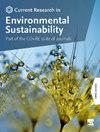影响非洲植树计划治理的宏观环境因素分析
IF 3.8
Q2 ENVIRONMENTAL SCIENCES
Current Research in Environmental Sustainability
Pub Date : 2025-01-01
DOI:10.1016/j.crsust.2025.100302
引用次数: 0
摘要
非洲的植树计划因其解决环境退化、增强生物多样性和支持社会经济发展的潜力而日益受到推广。然而,复杂和相互关联的宏观环境因素制约着这些目标的实现。虽然过去的研究评估了影响植树计划成功的地方层面的技术、生态和治理挑战,但它们往往忽视了更广泛的宏观环境因素的影响。在这项研究中,我们通过回顾143份出版物,采访19名关键线人,并参与4个非洲国家(阿尔及利亚、喀麦隆、埃塞俄比亚和南非)的8项相关活动,分析了这些宏观环境因素的影响。我们采用了名为PESTEL(政治、经济、社会、技术、生态和法律)的宏观环境分析框架来分析这些因素的影响,并辅以多中心治理和社会技术转型理论。我们的研究结果显示,尽管PESTEL因素主导了话语,但历史遗产、制度不稳定和新兴的跨部门因素也发挥了关键作用。因此,我们将PESTEL框架扩展为hpestel +,将历史(H)、制度(I)和灵活的“+”维度结合起来,以捕捉特定环境的影响。hpestei +框架为政策制定者和从业者提供了一个全面的诊断工具,以确定支持可持续植树的跨领域和具体环境因素。我们认为,全面了解这些宏观环境因素对于加强非洲及其他地区植树计划的治理和长期可持续性至关重要。本文章由计算机程序翻译,如有差异,请以英文原文为准。
An analysis of macro-environment factors influencing the governance of tree planting schemes in Africa
Tree planting schemes in Africa are increasingly promoted for their potential to address environmental degradation, enhance biodiversity, and support socioeconomic development. Yet, complex and interrelated macro-environmental factors constrain the achievement of these targets. While past studies have assessed local-level technical, ecological, and governance challenges influencing the success of tree planting schemes, they have often overlooked the influence of broader macro-environmental factors. In this study, we analysed the influence of these macro-environmental factors by reviewing 143 publications, interviewing 19 key informants, and participating in 8 related events across four African countries (Algeria, Cameroon, Ethiopia, and South Africa). We employed the macroenvironment analysis framework called PESTEL (Political, Economic, Social, Technological, Ecological, and Legal) to analyse the influence of these factors supplemented by polycentric governance and socio-technical transition theories. Our findings revealed that while PESTEL factors dominate the discourse, historical legacies, institutional instability, and emergent cross-sectoral factors also play critical roles. Accordingly, we expanded the PESTEL framework to HPESTELI+, incorporating Historical (H), Institutional (I), and a flexible ‘+’ dimension to capture context-specific influences. The HPESTELI+ framework offers a comprehensive diagnostic tool for policymakers and practitioners to identify cross-cutting and context-specific factors that support sustainable tree planting. We argue that a holistic understanding of these macro-environmental factors is crucial for enhancing governance and the long-term sustainability of tree planting schemes in Africa and beyond.
求助全文
通过发布文献求助,成功后即可免费获取论文全文。
去求助
来源期刊

Current Research in Environmental Sustainability
Environmental Science-General Environmental Science
CiteScore
7.50
自引率
9.10%
发文量
76
审稿时长
95 days
 求助内容:
求助内容: 应助结果提醒方式:
应助结果提醒方式:


